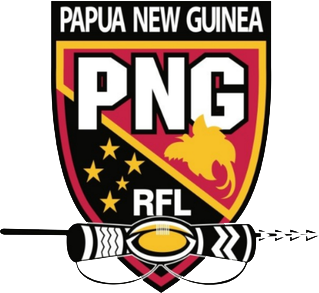
Melanesia is a subregion of Oceania in the southwestern Pacific Ocean. It extends from New Guinea in the west to the Fiji Islands in the east, and includes the Arafura Sea.

The music of Papua New Guinea has a long history.

The Papua New Guinea national rugby league team represents Papua New Guinea in the sport of rugby league football.
The Pan Melanesian Congress was a political party in Papua New Guinea.

New Bougainville Party (NBP) is a political party in the Autonomous Region of Bougainville in Papua New Guinea.

The Evangelical Lutheran Church of Papua New Guinea is a Protestant church denomination located in Papua New Guinea that professes the Lutheran branch of the Christian faith. The Church is incorporated by a 1991 Act of the Parliament of Papua New Guinea and it has a baptized membership of approximately 900,000 members.

Religion in Papua New Guinea is dominated by various branches of Christianity, with traditional animism and ancestor worship often occurring less openly as another layer underneath or more openly side by side with Christianity. The Catholic Church has a plurality of the population. The courts, government, and general society uphold a constitutional right to freedom of speech, thought, and beliefs. A secular state, there is no state religion in the country, although the government openly partners with several Christian groups to provide services, and churches participate in local government bodies.

The culture of Papua New Guinea is complex and multifaceted. It is estimated that more than 7000 different cultural groups exist in Papua New Guinea, and most groups have their own language. Because of this diversity, in which they take pride, many different styles of cultural expression have emerged; each group has created its own expressive forms in art, dance, weaponry, costumes, singing, music, architecture and much more. To unify the nation, the language Tok Pisin, once called Neo-Melanesian has evolved as the lingua franca — the medium through which diverse language groups are able to communicate with one another in Parliament, in the news media, and elsewhere. People typically live in villages or dispersed hamlets which rely on the subsistence farming of yams and taro. The principal livestock in traditional Papua New Guinea is the oceanic pig.
David Ross Hope Bridie is an Australian contemporary musician and songwriter. He was a founding mainstay member of World music band Not Drowning, Waving which released six studio albums to critical acclaim. He also formed a chamber pop group, My Friend the Chocolate Cake, which released seven studio albums. During his solo career he has issued five studio albums and worked on soundtracks for Australian films and television like The Man Who Sued God, Remote Area Nurse, Secret City, and The Circuit. Bridie is the founder and artistic director of Wantok Musik Foundation; a not-for-profit music label that records, releases and promotes culturally infused music from Indigenous Australia, Melanesia and Oceania. In 2019 he received the Don Banks Music Award.
George Telek Mamua MBE, commonly known simply as Telek, is a musician and singer from Papua New Guinea. He has won one ARIA Award for this 1997 self-titled album. Telek sings in his native language, Kuanua, and in Tok Pisin. Many of his songs are sung in three-part harmonies that are characteristic of the Tolai.

Sir Michael Thomas Somare was a Papua New Guinean politician. Widely called the "father of the nation", he was the first Prime Minister after independence. At the time of his death, Somare was also the longest-serving prime minister, having been in office for 17 years over three separate terms: from 1975 to 1980; from 1982 to 1985; and from 2002 to 2011. His political career spanned from 1968 until his retirement in 2017. Besides serving as PM, he was minister of foreign affairs, leader of the opposition and governor of East Sepik Province.
Blasius To Una Turtavu was a Papua New Guinean musician. He composed hymns in his language Kuanua. He has been described as "probably the first Papua New Guinean music personality to receive attention from a wide public".
Nova was an Italian progressive rock band that was formed in 1975 from members of the bands Osanna and Cervello. Based in London for most of their career, they released four albums that were influenced by the 1970s jazz fusion styles of bands such as Mahavishnu Orchestra, Weather Report, and Return to Forever.

Bob Halstead, has made significant contributions to the sport of scuba diving in a multitude of capacities: photographer, author of eight diving books, early innovator in the development of dive tourism, pioneer in the dive liveaboard industry, diving instructor and educator, marine-life explorer and influential diving industry commentator. An ardent diver since 1968, Halstead has over 10,000 logged dives.

Corruption is rife in Papua New Guinea (PNG). According to The Economist, "PNG's governments are notorious for corruption, and ever run the risk of turning the state into a fully-fledged kleptocracy".
The 2003 Melanesian Championships in Athletics took place between April 25–27, 2003. The event was held in Lae, Papua New Guinea in conjunction with the Papua New Guinea National Athletics Championships.
The 2005 Melanesian Championships in Athletics took place between April 22–24, 2005. The event was held at the Sir Ignatius Kilage Stadium in Lae, Papua New Guinea, in conjunction with the Papua New Guinea National Athletics Championships. Detailed reports were given for the OAA.
Papua New Guinean Sign Language (PNGSL) is a sign language originating from Papua New Guinea. The standardised form of PNGSL was made an official language of Papua New Guinea in 2015.
Airileke "Airi" David Ingram, also referred to mononymously as Airileke, is a Papua New Guinean-Australian musician and producer. His album Weapon of Choice was nominated at the ARIA Music Awards of 2013 for Best World Music Album.

The Papua New Guinea National Museum and Art Gallery (NMAG) is a museum and art gallery in Waigani, Port Moresby, Papua New Guinea. It is the national museum of Papua New Guinea.